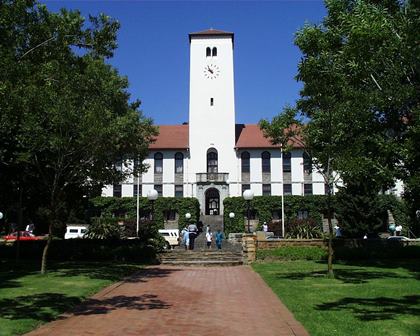Rhodes University closed for its mid-semester break on Saturday 26 August. While the University hosted the annual Highway Africa conference over this time, it honoured its promise to provide free accommodation for students who wished to stay on campus for the duration of the week-long vacation. Students still, however, faced the prospect of having to pay certain charges should they not attend all meals or not stay in residence for the full duration of the vacation.
Following the 2015 #Feesmustfall protests, Rhodes University management engaged with a number of demands made by the student body which addressed the struggles and realities faced by many of the students.
Included in the list of demands was a request for free accommodation facilities to be made available over the short September break for students who could not afford the trip home, or who required the use of libraries, computer labs and/or other facilities over the vacation period.
Prior to this, students wishing to stay in residence over the short breaks were accommodated but were required to pay a daily fee to cover the costs experienced by the university. For most, this made the option of staying on campus a cost on par with that of going home.
The university agreed to the proposal of free vacation accommodation, and the new system was implemented in 2016 in time for the September vacation.
It proved to be a process of trial-and-error, however, and the new accommodation system held a number of consequences for the university. Each year, the university hosts various conferences, such as Highway Africa, during the shorter breaks and will rent out residence rooms as accommodation for conference guests. This provides the university with a significant source of income which it in turn uses to subsidise the residence fees paid by students.
In the August/September vacations of last year, the university allowed all students who applied to stay on campus for vacation to stay in their existing residence rooms, meaning that it could not make any residences available for conference guests. Consequently, says Charmaine Avery of the Rhodes University Conference and Events Office, the university lost out on a significant source of income, with a knock-on effect on residence budgeting.
Furthermore, the university saw significant amounts of food wastage in the dining halls over the 2016 short vacations amounting to approximately R200 000. Wastage occurred as a result of students not claiming all their meals at the dining halls, or opting to leave town for some of the days they had originally booked on-campus accommodation for.
This year, the university tweaked the process of vacation accommodation, choosing to centralise the students staying on campus for the vacations by allocating all of them into specific residences and dining halls. Doing so allows the remaining residences to be made available to conference guests, while still accommodating the students who requested to stay in residence town for the vacation.
The university also introduced a fee of R159/day charged to students who had booked for vacation accommodation and who subsequently did not stay for the full duration. Students staying in residences for the vacation also have to pay for any meals they did not attend in order to compensate for food wastage.
Dr Chrissie Boughey, Deputy Vice-Chancellor: Academic and Student Affairs of Rhodes University, highlights that, while the university remains dedicated to serving the needs of the student body, the university wishes to avoid wastage and is not in a position to forgo the income generated through the use of residences by conference guests.
“If [a student]really needs to stay [because they can’t afford a bus ticket], then we assume they don’t have money for food either,’ she told Grocott’s Mail. “Therefore, we said all students have to eat lunch and dinner provided in the dining hall and, if they don’t, they would have to pay for them.”
Prior to implementation, these changes to the vacation accommodation system were put to student representatives at the Board of Residents and the Student Services council for approval. The Rhodes University Student Representative Council (SRC) were also made aware of these changes and were supportive thereof.
As yet, it is not possible for students who request to stay in residence over a short vacation to unbook their meals, as is possible during term time. Boughey, however, said students who needed to miss a meal due to legitimate reasons, such as religious fasts, would not be penallised.



